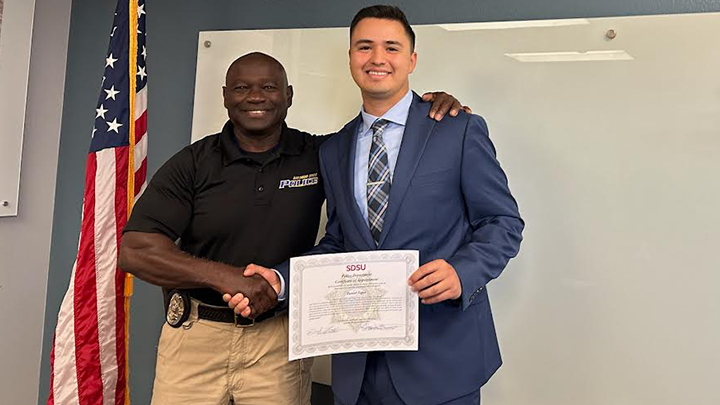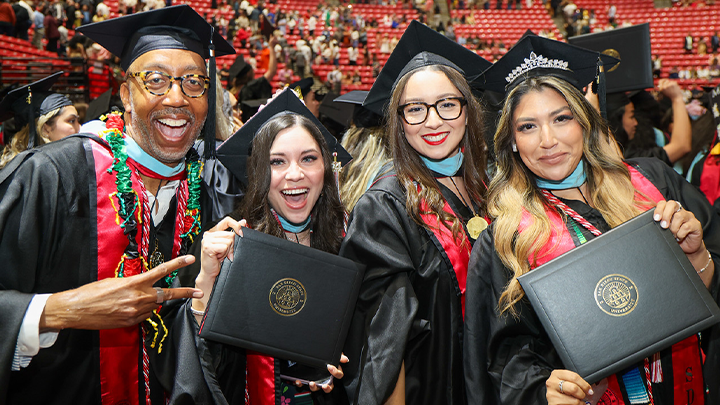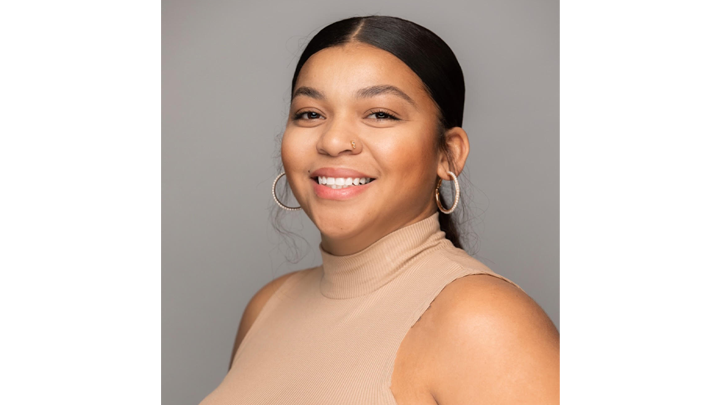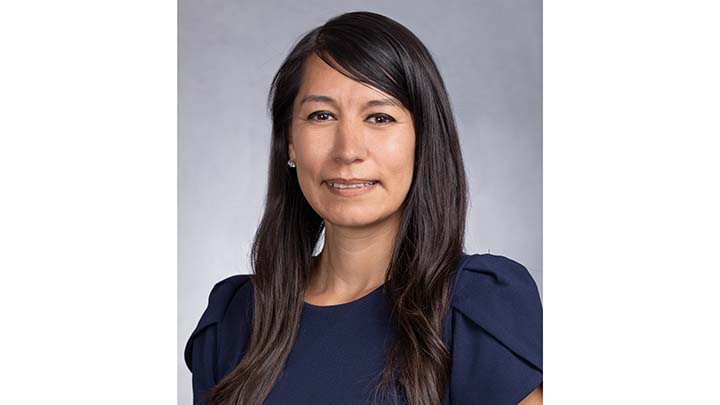Daniel's path to SDSU peace officer
From community service officer to university peace officer, Daniel Tapia tells his journey rising through the ranks at SDSU.

For Daniel Tapia, the path from a Community Service Officer (CSO) to becoming a peace officer with the University Police Department (UPD) at San Diego State University (SDSU) has been a journey marked by dedication, growth and a deep commitment to serving the campus community.
Tapia's tenure as a CSO began in 2018, where he found himself immersed in the day-to-day operations as a civilian employee for UPD, familiarizing himself with the campus landscape and its security needs. As he gained experience, he eventually assumed the role of CSO lead supervisor. This transition exposed him to the administrative side of campus security, where he handled tasks ranging from payroll management to facilitating the hiring process.
“The UPD Community Service Officer program gives students an opportunity to ‘look behind the curtain’ and see how the operations of a police department works and what police officers really do,” said Lt. Ruben Villegas for University Police. “It gives them an idea if a career in law enforcement is something they want to pursue. Even if it's not UPD, we have had many CSO's who went on to work for various agencies within the county, the state and even federally.”
Reflecting on his journey, Tapia acknowledges the pivotal role the CSO program played in shaping his work ethic and leadership skills. From time management to public speaking, the program equipped him with valuable tools essential for his role as a supervisor and, later, as a peace officer.
Tapia emphasizes the importance of interaction with students, a cornerstone of his experience both as a CSO and now as a peace officer. He highlights the misconception that many students may not be aware of the presence and contributions of CSOs within the university community.
“Each and every day, I wanted to make an impact by asking individuals how their day was, getting involved and showing the community that we're fully engaged,” said Tapia. “Many people don't have exposure to law enforcement and it's understandable that perceptions may vary based on personal experiences or media portrayals. My goal, each and every day, is to show someone that we're all human; we're all individuals with diverse backgrounds and experiences. By fostering understanding and empathy, we can bridge the gap between law enforcement and the community we serve.”
As a CSO, Tapia often found himself in situations where he could make a difference, whether it was unlocking doors for students or providing escorts across campus. These interactions, however brief, underscored the importance of making individuals feel safe and supported in their university environment.
Transitioning from a CSO to a peace officer, Tapia underwent rigorous training, including graduating from the police academy. The controlled environment of the academy provided him with essential tactical and strategic skills, preparing him for the dynamic challenges of patrolling the campus.
“I have everything to give and be thankful for when it comes to the CSO pipeline. It's been an invaluable experience that has shaped not only my career but also my perspective on law enforcement.”
For Tapia, the appeal of his role lies in the constant interaction with people and the sense of community he fosters. Having been a student at SDSU himself, Tapia finds fulfillment in serving the community he knows so well. He cherishes the vibrancy of campus life, from lively concerts and sports events, to everyday interactions with students and faculty.
“Daniel Tapia is a guy who you can count on to be there and get the job done,” said Patrick McMullen, a detective for University Police. “When I supervised him during his time as the CSO lead supervisor, I knew that I didn't have to worry about him or if the task would be successful, which made my job a lot easier.”
Tapia credits the CSO pipeline for providing him and other students with invaluable exposure to law enforcement careers. He recognizes the potential it holds for students aspiring to pursue similar paths and emphasizes the role it plays in connecting individuals with various agencies.
"I have everything to give and be thankful for when it comes to the CSO pipeline,” said Tapia. “It's been an invaluable experience that has shaped not only my career but also my perspective on law enforcement. Through this program, I've come to realize the vast opportunities available within the field, and I'm grateful for the exposure it has provided me. I know there are students out there who share my aspirations for a career in law enforcement and the CSO pipeline serves as an ideal gateway for them. It not only equips individuals with essential skills and knowledge but also puts them in direct contact with various agencies, laying the foundation for a fulfilling and impactful career in service to others."
Looking ahead, Tapia sees himself continuing to serve SDSU for years to come. His unwavering commitment to the community and his passion for protecting his alma mater reaffirm his dedication to making a difference, one interaction at a time. SDSU isn't just a workplace for Tapia; it's home—a place he's determined to safeguard and nurture for future generations.
If you’re a student interested in becoming a CSO, please fill out the following application. Download the CSO Application



